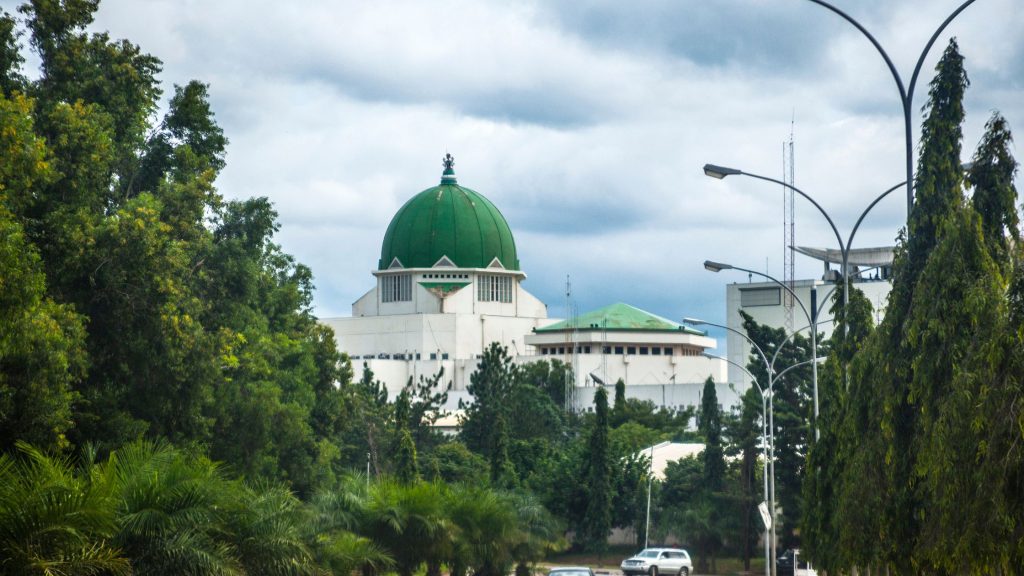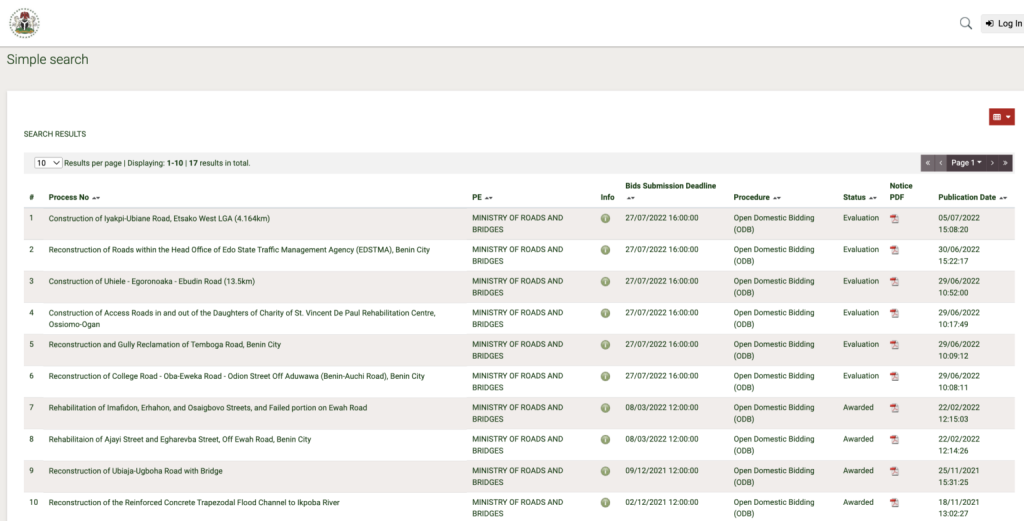Nigeria’s current public procurement system is plagued by inefficiency, opacity and corruption and desperately needs modernization. Digital transformation offers a promising pathway to revolutionize how government contracts get awarded and managed in Nigeria. Naturally, implementing these changes would require strategic planning and unwavering political will.

The Current State of Public Procurement in Nigeria
Public procurement in Nigeria represents a substantial portion of the nation’s economic activity, with annual expenditures estimated to range from 10% to 25% of GDP. This significant financial footprint shows the importance of transparency and accountability in Nigeria’s procurement systems.
The journey toward reformed procurement practices in Nigeria began meaningfully in 1999 with the return to democratic governance. Prior to this period, the country lacked a robust legal framework to guide public procurement activities. During the military era, procurement was regulated by the Ministry of Finance through internal guidelines that were often opaque and inaccessible to the public and potential bidders.
A turning point came in 2000 when President Olusegun Obasanjo requested assistance from the World Bank to assess Nigeria’s procurement practices. The resulting Country Procurement Assessment Report revealed significant deficiencies in the existing system and identified practices that fostered corruption, failed to deliver value for money and subjected procurement decisions to the discretion of government officials. These findings led to the enactment of the Public Procurement Act in 2007, which established the Bureau of Public Procurement as the regulatory body for federal procurement activities. The Act aimed to ensure that public procurement processes are fair, competitive, efficient and transparent.
Still Waiting for the National Council on Public Procurement
Despite this legislative framework, implementation has been slow and inconsistent. A key provision of the Act called for the establishment of a National Council on Public Procurement (NCPP), which would be responsible for evaluating and adjusting monetary thresholds for procurement entities. However, this council has yet to be constituted, betraying the lack of political will that continues to hinder full implementation of the Act. At the state level, many states have adopted their own procurement laws modelled after the federal framework. Some states, like Edo, Kaduna and Ekiti, have even surpassed federal efforts by implementing e-procurement platforms with World Bank assistance. These platforms have enhanced transparency by standardizing procedures, reducing complexity and creating a more level playing field for bidders, particularly benefiting smaller enterprises.
What Nigeria’s Public Procurement Currently Looks Like
The current procurement landscape in Nigeria exhibits several distinct characteristics. Primarily, public procurement contracts are typically advertised in national newspapers and the Federal Tender Journal, though timing issues often reduce the window for potential bidders to prepare competitive proposals. Open competitive bidding is the predominant approach, though again, restrictive bidding is used in certain situations, particularly for security-related procurement.
Significant challenges persist in the Nigerian procurement system. Political interference frequently undermines the principles of fairness and accountability, as political interests sometimes take precedence over socioeconomic considerations in procurement decisions. Clearly, the uneven distribution of procurement personnel across ministries, departments and agencies (MDAs) creates inefficiencies, with some agencies overstaffed while others experience critical shortages. Access to comprehensive procurement data remains limited despite initiatives like the Nigeria Open Contracting Portal (NOCOPO). While the portal displays ongoing contracts, it falls short of providing the timely, comprehensive data needed for effective planning and monitoring.
The federal government’s commitment to implementing e-procurement has been slow to materialize. Despite allocating N1.6 billion in 2020 for an e-procurement platform, the project remains in development. This sluggishness contrasts sharply with the progress made by states like Kaduna and Ekiti, where e-procurement systems have already transformed procurement processes.

Tinubu’s ‘Nigeria First Policy’ Reforms
On May 16, 2025, in a significant policy shift, President Bola Ahmed Tinubu approved a sweeping overhaul of Nigeria’s public procurement thresholds. Under the new regime, the Federal Executive Council (FEC) will be responsible for approving contracts from N5 billion and above for goods and services and ₦10 billion and above for works. The new rules are designed to streamline procurement, decentralize contract approvals, and enhance transparency across MDAs. For projects of lower value, the Ministerial Tenders Board will approve contracts from ₦50 million to ₦1 billion for goods and services, and ₦50 million to N2.5 billion for works projects. Parastatal Tenders Boards are to approve contracts up to ₦500 million for goods and services, and up to ₦1 billion for works. Accounting Officers of MDAs are to approve contracts below ₦50 million for goods and services and below ₦100 million for works.
The new framework also clarifies the procurement methods to be adopted by MDAs based on contract values. Projects valued at ₦1 billion and above for goods and services and those valued at ₦5 billion and above for works must go through the National and International Competitive Bidding process. Such projects must also have requests for quotations and prequalification requirements. In addition, MDAs must publish monthly procurement reports on their websites and the BPP portal, including all awarded contracts for transparency and accountability. MDAs are also expected to budget for procurement training using only BPP-accredited trainers.
National Procurement Certification Portal (NPCP) – A Small But Significant Step Towards Digital Transformation
Furthermore, the federal government has launched the National Procurement Certification Portal (NPCP) to enhance effective and transparent utilization of public finance. The NPCP, a World Bank-sponsored project, is an initiative of the BPP under the leadership of its new Director General, Dr. Adebowale Adedokun. The portal aims to address persistent bottlenecks such as suboptimal procurement practices, insufficiently skilled personnel and the lack of institutionalized capacity-building frameworks.
While these policy developments represent steps toward reforming Nigeria’s public procurement system, they primarily focus on bureaucratic restructuring and policy directives. The emphasis on decentralizing contract approvals and mandating local content in procurement processes are commendable. However, these measures may fall short without a comprehensive digital transformation strategy.

Edo State as a Case Study
Between 2020 and 2022, Edo State undertook a comprehensive reform of its procurement system and transitioned from a paper-based approach to a fully digital, open-access e-procurement model. This transformation was supported under the World Bank’s States Fiscal Transparency, Accountability, and Sustainability (SFTAS) Programme for Results. The project offered a cloud-based Software-as-a-Service (SaaS) e-procurement platform for the state to transact with vendors. The reform addressed systemic inefficiencies long associated with opaque procurement practices. By introducing an e-procurement portal, the Edo State Bureau of Public Procurement enabled open competitive bidding, real-time tracking of contract awards and increased public oversight. These measures enhanced value-for-money in government contracts, reduced opportunities for rent-seeking, and signalled a new standard of fiscal discipline.
Success was underpinned by strong political will, notably from the governor’s office, as well as the technical leadership of the BPP and sustained collaboration with partners such as the World Bank and BudgIT. While initial resistance emerged from stakeholders accustomed to informal networks of influence, the reform was gradually institutionalized through capacity building, legal frameworks, and performance-based incentives.
Nonetheless, challenges persist. Some MDAs continue to rely on hybrid processes, broadband infrastructure remains uneven and data literacy among citizens limits the full utility of published information. Yet these are transitional hurdles, not structural flaws. Edo’s experience demonstrates that public procurement reform is not merely an administrative upgrade, it is a governance milestone. By embedding transparency into the machinery of the state, the reform promotes accountability, rebuilds public trust and redefines the relationship between government and citizens.

The Promise of Digital Transformation
Digital transformation in public procurement involves leveraging technology to automate and streamline processes from tendering to contract management. The benefits include:
It enhances transparency
Digital platforms provide real-time access to procurement data, to allow stakeholders monitor processes and detect irregularities. This visibility makes it harder to conceal corrupt practices and builds public trust in government spending.
Improves efficiency
Automation significantly reduces the time and resources required for procurement activities. Digital systems minimize delays and errors, accelerating the entire procurement cycle from planning to execution.
Saves costs
By promoting competitive bidding and reducing corruption opportunities, digital procurement leads to notable cost reductions. These savings can redirect funds to other critical government services and infrastructure projects.
Compels greater accountability
Digital records create an unbroken audit trail, facilitating oversight and enforcement of procurement regulations. This documentation makes it easier to hold officials accountable for their decisions and actions. Edo State’s experience demonstrates these benefits in practice. By transitioning from paper-based to cloud-based e-procurement, the state enhanced transparency and efficiency in its processes. Between 2018 and 2022, Edo State published data on 600 procurement processes worth ₦91.6 billion, involving 31 agencies and representing a significant step toward open contracting.

Major Challenges to Digital Transformation
Despite the clear advantages, several obstacles hinder the widespread adoption of digital procurement in Nigeria:
1. Infrastructure Deficits
Reliable internet connectivity and power supply are prerequisites for functional digital systems. Many regions in Nigeria suffer from inadequate infrastructure. Frequent power outages and limited broadband coverage naturally impede the operation of e-procurement platforms.
2. Skill Gaps
Successfully implementing digital procurement requires personnel with specialized technical skills. Unfortunately, Nigeria faces a shortage of trained procurement professionals. In 2022, only 542 students gained admission into procurement-related courses across Nigerian universities. This betrays an urgent need for capacity building.
3. Resistance to Change
Organizational inertia and fear of the unknown often generate resistance against new systems. Employees accustomed to traditional methods may resist adopting digital tools, especially if they perceive them as threats to job security or as adding complexity to their work.
4. Corruption and Lack of Political Will
Digital procurement systems expose corrupt practices, making them unattractive to individuals benefiting from the status quo. The lack of political commitment to enforce procurement laws and support digital initiatives undermines reform efforts and maintains the broken system.
5. Outdated Legal Frameworks
Existing procurement laws don’t adequately address the nuances of digital procurement. Nigeria needs updated legislation that encompasses digital technologies and provides clear guidelines for their use in procurement processes.
How Nigeria Can Get Started
To overcome these challenges and harness the full potential of digital procurement, Nigeria must implement a comprehensive approach:
1. Invest in Critical Infrastructure
The government should prioritize developing ICT infrastructure to ensure reliable internet connectivity and power supply nationwide. Public-private partnerships can mobilize resources for these essential infrastructure projects and accelerate deployment.
2. Build Technical Capacity
Nigeria must establish specialized training centers and integrate procurement courses into university curricula to develop a skilled workforce. Continuous professional development programs should keep procurement officers updated on technological advancements and best practices.
3. Implement Change Management Strategies
Comprehensive change management strategies can facilitate the transition to digital systems. This approach includes engaging stakeholders, providing adequate training, and demonstrating the benefits of digital procurement to gain buy-in from employees at all levels.
4. Strengthen Legal and Regulatory Frameworks
Updating procurement laws to reflect digital realities is crucial. New legislation should address data protection, electronic signatures, and cybersecurity, providing a robust legal foundation for digital procurement operations.
5. Enhance Transparency Through Open Data
Developing open data portals where procurement information becomes publicly accessible can deter corrupt practices. Engaging civil society organizations and media in monitoring procurement activities further promotes accountability and builds public trust.
6. Secure High-Level Political Commitment
Leadership at all levels must demonstrate unwavering commitment to reform. This commitment includes enforcing procurement laws, supporting digital initiatives with adequate resources, and holding individuals accountable for malpractices.
7. Implement in Phases
A phased implementation approach allows for testing, learning, and adaptation. Starting with pilot projects in selected government agencies can demonstrate success, build momentum, and identify potential challenges before full-scale deployment.
8. Standardize and Integrate Systems
Standardizing procurement processes and ensuring system interoperability across government agencies eliminates inefficiencies and creates a unified digital procurement ecosystem. This integration facilitates data sharing and comprehensive analytics.
The Path Forward
Digital transformation holds tremendous potential for revolutionizing public procurement in Nigeria. By addressing infrastructural deficits, building human capacity, enacting supportive legislation and fostering a culture of transparency, Nigeria can overcome existing challenges and establish a procurement system that works efficiently and ethically.
NQLB has helped governments across West Africa transform their operations using cutting-edge digitization solutions that enhance transparency, reduce costs and deliver measurable efficiency gains.
